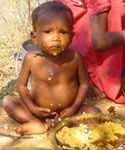Early Childhood Care and Education: Worldwide
Challenges and ProgressesVolume 11 / 2009
(rev 11/2009)
ISSN 1523-1615Available at http://www.tc.edu/cice
"The
consensus seems to be that early exposure to learning experiences
in
a stimulating environment will lead children to perform better in primary
schools. In time
these
individuals become more productive, healthier citizens in democratic society.
Researchers
have
determined that the long-term effect of early learning and education can be
observed in all
children
with varying abilities, including those with or at risk of developmental delay (CICE, 2009)".
This movement in education
has been almost universal.
Many
developed countries have begunto
turn their attention to “very early” education of children from birth to
pre-primary ages.
"Focused
development of early childhood education programs is now in demand. The general
disposition
is that the age-scope of early childhood education should be extended from
preschool
and pre-primary ages to all
young children from birth (Gallagher, Clifford, & Maxwell,
2004)."
While the concern for early childhood development is universal each geographic location may have varying concerns and barriers. Often these barriers create inequity and possibly a lack of quality.
Many nations mentioned in the article have high poverty rates and experience a lack of funding to have proper and adequate materials and quality staff. Some classrooms are only partially furnished, often only having some of the text books. This creates an inequity in service and doesn't place all children on the same level for learning. Struggles exist for all nations, to address policy change. While the research is there to support the importance of early development it is crucial that policies are in place to help create a strong system that uses standards as a guide to curriculum and assessments of quality.
Center on the Developing Child: Harvard University
As part of its Global Children’s Initiative, the Center is launching Núcleo Ciência Pela Infância, its first major programmatic effort outside the United States. In collaboration with local experts, this project aims to use the science of child health and development to guide stronger policies and larger investments to benefit young children and their families in Brazil

